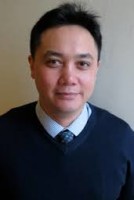Dr. Jousse Lecture Series
Welcome to the new Dr. Albin T Jousse Lecture Series in collaboration with Best Practice Forum, which is sponsored by the Rehabilitation Engineering Laboratory, the Spinal Cord Rehab Program, the Neural Engineering and Therapeutics Team, and Toronto Rehab.
The purpose of this lecture series is to provide a venue for scientists, physicians and clinicians working in rehab settings as well as students, consumers and their caregivers to share knowledge, present the latest research findings and participate in a dialogue on what it means to live with disability. The lectures will be 45 minute long followed by 15 minutes of questions.
Coordinator of the Dr. Albin T. Jousse Lecture Series is Dr. Kristin Musselman . If you have any comments, concerns or would like to present please send us an email at kristin.musselman@uhn.ca.
The series is currently in its 11th season.

- This lecture has passed.
Dr. Cesar Marquez-Chin – Brain-Machine Interfaces at the Toronto Rehabilitation Institute.
December 8, 2016 @ 12:00 pm - 1:00 pm

Abstract
Did you know that the Lyndhurst Centre has an active research program connecting brains and machines directly? In this talk I will introduce brain-computer interfaces, devices that can translate brain signals into control commands for electronic devices, share with you some of the work conducted in this field at the Toronto Rehabilitation Institute over the last decade, and discuss potential applications of this technology for rehabilitation after stroke and spinal cord injury.
About the Speaker
Dr. Márquez Chin is a scientist with the Neural Engineering and Therapeutics Team at the Toronto Rehabilitation Institute – University Health Network. A biomedical engineer by training, his professional activities have included clinical, research, and development settings. His primary research interests include the development and understanding of rehabilitation technologies and the interaction between these devices and their users, including consumers and care providers. Central to his work is the creation of systems that use brain signals to control electronic devices. His current areas of work include neurophysiological research, brain-machine interfacing, and rehabilitation robotics. Dr. Márquez Chin holds a PhD in biomedical engineering from the University of Toronto.